A Midsummer Night's Dream
By William Shakespeare
Written about 1596 and first printed in a 1600 quarto
Act I, Scene 1
Theseus, the Duke of Athens, has defeated the Amazons in a war but now intends to marry their queen, Hippolyta. The wedding is set for four days' hence, and while he is eager to get on with the nuptials, she is showing much more patience. Into the scene comes Egeus with his daughter, Hermia, and two men, Lysander and Demetrius. Egeus wants Hermia to marry Demetrius, but she is in love with Lysander and refuses her father's will. For this, Egeus wants his daughter executed under Athenian law. Theseus at least gives Hermia another option—become a virgin votary—but allows her three days to choose whether to marry Demetrius, enter the sisterhood, or die. Left alone (really?), Lysander and Hermia complain about the not-so-smooth-course of true love and then determine to flee Athens, meet in the woods, and run off to his aunt's home where they can marry. Then enters Hermia's BFF, Helena, and it so happens that Demetrius used to be Helena's boyfriend until he saw Hermia and then began chasing the latter. Hermia tells Helena about her intended flight with Lysander, and off the couple go to make ready, leaving a pouting Helena to come up with the harebrained scheme of telling Demetrius about Hermia's flight so that he would more appreciate Helena—even though she knows he will fly after Hermia and Lysander.
Act I, Scene 2
Five craftsmen gather: Peter Quince, a carpenter; Nick Bottom, a weaver; Francis Flute, a bellows-mender; Robin Starveling, a tailor; Tom Snout, a tinker; and Snug, a joiner. They are going to mount a play called The Most Lamentable Comedy and Most Cruel Death of Pyramus and Thisbe, a play about young lovers being kept apart by a wall their fathers have built but who steal away for a rendezvous in the moonlight only to encounter a lion that, by ironic happenstance, leads Pyramus to believe Thisbe is dead, whereupon he kills himself, whereupon she discovering his dead body kills herself. These "Rude Mechanicals," as a character later calls them, hope to play Pyramus and Thisbe as part of the Theseus-Hippolyta wedding celebration. Quince is the writer and director, and he casts Bottom as Pyramus. Bottom reveals himself to be a blowhard (albeit a kind one) as he displays his supposed thespian skills. Quince casts Flute as Thisbe who protests playing a woman, whereupon Bottom asks to play Thisbe, as well. But no, Flute will play Thisbe, and the other parts are cast, concluding with Snug as the Lion—upon which Bottom demands to play the Lion, too. But no, Snug will play Lion (he's afraid he will never be able to learn his lines, though they are just roaring). The group will meet in the woods the next night in order to rehearse in private.
Act II, Scene 1
In the Athenian woods, two fairies meet. One of them is Robin Goodfellow, nicknamed Puck, a mischief maker who serves the Fairy King, Oberon. The other sprite serves the Fairy Queen, Titania, and we find out in this conversation that the royal couple of fairyland have fallen out and want nothing to do with each other. But both are heading for Athens to bless the wedding bed of Theseus and Hippolyta (apparently both have had past relationships with one or the other Athenian and Amazonian) and so they ill-meet by moonlight here in this woods. The cause of their dispute: an Indian changeling boy whom Titania says belongs to her because it is the son of one of her votaries who died in childbirth, but Oberon wants him as a henchman. Over this, they have created such discord that summer has turned cold and dreary. Really—makes one wonder what would cause them enough discord to result in a hurricane. Oberon, peeved at her rebuke, orders Puck to fetch a flower, called love-in-idleness, that suffered an accidental strike from one of Cupid's arrows, the juice of which serves as a love potion. Oberon will apply this potion to the sleeping Titania's eyes so that the first thing she sees upon waking she will straightaway fall in love. As Oberon awaits Puck's return, Demetrius, stalking after Hermia and Lysander, and Helena, stalking Demetrius, walk into the scene, and Oberon watches Helena in utter self-deprecation plead with Demetrius to love her. He runs off, she runs after, and when Puck returns, Oberon takes some of the flowers to use on Titania and orders Puck to find and apply the flower's love juice to the Athenian youth he has just seen.
Act II, Scene 2
After some midnight revels with her attendants, Titania falls asleep. Oberon enters, applies the love potion, and leaves. Then enters Hermia and Lysander, who has lost his way. They decide to sleep (Hermia insisting Lysander lie further off), and Puck happens by. Seeing a lad of Athenian clothes and what he surmises as the disdained woman, he applies the love potion to Lysander. In comes Demetrius with Helena in pursuit. Demetrius finally shakes himself free of Helena, who, after a whining soliloquy, notices Lysander on the ground. Fearing he might be dead, she wakes him, and he falls in love with her, she being the first being he sees. She thinks he's ridiculing herand storms off, and he follows, consciously leaving Hermia alone. A nightmare awakens Hermia, she finds Lysander gone and leaves in search of him.
Act III, Scene 1
The Rude Mechanicals arrive in the woods to rehearse the play and make changes to the script in response to certain troublesome circumstances: Bottom gets a prologue (lest the audience fear he is really Pyramus and really kills himself); Snug gets a prologue (lest the ladies be frightened thinking he's really a lion); Starveling is recast as the Moon (no other way to get moonshine into the great chamber); and Snout is recast as the Wall (no other way of bringing a wall into the great chamber). They begin to rehearse, and Puck happens upon them, noting that they are near the Fairy Queen's bower. When Bottom goes into a brake as part of the rehearsal, Puck follows and transforms Bottom, giving him a donkey's head. The sight frightens his fellows, who run off in panic, leaving an unwitting Bottom alone in the woods. He begins to sing to shore up his courage, waking Titania and straightaway she falls in love with the ass-head Bottom. She brings in her attendant fairies—Peaseblossom, Cobweb, Moth, and Mustardseed—to serve him, and they all head off stage for some romantic hijinks.
Act III, Scene 2
Puck reports to Oberon that Titania with a monster is in love, which delights the Fairy King to no end. Puck also reports on his success in applying the love potion to the Athenian youth, but just then Demetrius and Hermia enter, both still searching for Lysander (and she certain that Demetrius has killed her love). Hermia leaves, and Demetrius falls asleep. Puck's mistake laid bare, Oberon orders him to seek the woods for Helena and bring her to Demetrius. Meantime, Oberon infects Demetrius's eyes with the potion, and when Helena comes in followed by Lysander, Demetrius awakes and, sure enough, both guys now are rivals for the love of Helena rather than Hermia. Helena thinks it's all a joke, and then Hermia arrives, questioning why Lysander left her. Helena for some reason concludes that Hermia is in on the joke, Hermia is confused by both Helena's accusation and Lysander's behavior, and the two guys are simply besotted with Helena. When Lysander makes it clear that he hates Hermia and now loves Helena, Hermia flies into a jealous rage. A near brawl with a host of nasty insults ensue until finally Lysander and Demetrius go off to fight it out, Helena flees the intended assault by her former friend, and Hermia in amazement skulks off. Oberon orders Puck to make all right by shrouding the forest in a fog in order to magically bring the four Athenians together, putting them to sleep, and applying a love potion antidote to Lysander's eyes, all of which Puck does.
Act IV, Scene 1
Titania and Bottom enter with her train, she presents him gifts of food and drink and music. He grows tired, and the two fall asleep. Oberon enters, as does Puck. Oberon explains that, with the spellbound Titania cavorting with Bottom, he was able to convince her to give the changeling boy to him; and now that the boy is in his possession, Oberon lifts the spell from Titania. She thinks she's had a weird dream, he shows her the dream was real, and though she remains quizzical, they reunite in apparent harmony. Oberon orders Puck to return Bottom to his normal shape, which he does, and the fairies depart before the sun rises. With the four lovers and Bottom all still asleep on the ground, Theseus and Hippolyta, on an early morning hunt and accompanied by Egeon, enter and come upon the four lovers. Theseus has them wakened and orders an explanation. Lysander confesses their planned elopement, which leads Egeon to insist on a sentence for Hermia. But Demetrius intervenes and explains how he once again loves Helena. This prompts Theseus to not only overrule Egeon but invite the couples to join in one matrimonial ceremony with he and Hippolyta, and back to Athens they go, the four lovers still confused by the night's dreams. Bottom is the next to awake and after finally realizing he's been asleep, he remembers his fantastic dream and heads back to Athens planning to ask Quince to write a ballad called "Bottom's Dream."
Act IV, Scene 2
The other Rude Mechanicals back in Athens are grieving over what has happened to Bottom and the fact that they can't do their play without him, a bigger loss with news that two more couples are marrying in addition to Theseus and Hippolyta. Bottom arrives, and after a happy reunion and his hesitation to describe his experiences with the Fairy Queen, they get themselves ready to present their play by eating no onion or garlic.
Act V
The wedding done, Theseus and Hippolyta discuss the strange tale related by the four lovers, leading Theseus to compare lovers, madmen, and poets as people with hyper imaginations. The four lovers join the Duke and Duchess, and Theseus orders entertainment to while away the hours between ceremony and bedtime. After going over a list of potential shows, he chooses Pyramus and Thisbe over the protestations of Philostrate, his master of revels. The amateur actors stage their play. It is badly written, they are bad actors, and their staging techniques are amateurish, leading to the audience of lords and ladies to vocally insult the proceedings—insults which seem to go over the players' heads (particularly Bottom, who gives an overwrought performance as Pyramus). Play done and a dance follows, the mechanicals depart, the lords and ladies head to bed, and Puck enters with a broom, sweeping the way for Oberon and Titania with her train to bless the house with music and dance.
Epilogue
Puck gives the apologetic play-ending speech to the audience, suggesting that perhaps all that we've seen was just a dream.
Comment: e-mail editorial@shakespeareances.com
Start a discussion in the Bardroom




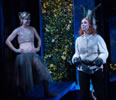
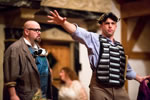
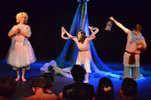
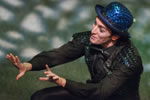
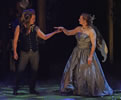





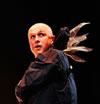








 Find additional Shakespeareances
Find additional Shakespeareances